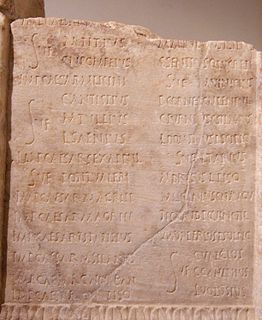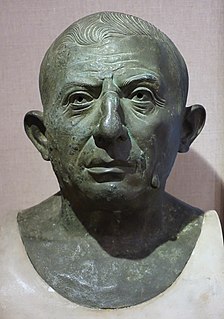Related Research Articles
The gens Sulpicia was one of the most ancient patrician families at ancient Rome, and produced a succession of distinguished men, from the foundation of the Republic to the imperial period. The first member of the gens who obtained the consulship was Servius Sulpicius Camerinus Cornutus, in 500 BC, only nine years after the expulsion of the Tarquins, and the last of the name who appears on the consular list was Sextus Sulpicius Tertullus in AD 158. Although originally patrician, the family also possessed plebeian members, some of whom may have been descended from freedmen of the gens.
The gens Tullia was a family at ancient Rome, with both patrician and plebeian branches. The first of this gens to obtain the consulship was Manius Tullius Longus in 500 BC, but the most illustrious of the family was Marcus Tullius Cicero, the statesman, orator, and scholar of the first century BC. The earliest of the Tullii who appear in history were patrician, but all of the Tullii mentioned in later times were plebeian, and some of them were descended from freedmen. The English form Tully, often found in older works, especially in reference to Cicero, is now considered antiquated.

The gens Aemilia, originally written Aimilia, was one of the greatest patrician families at Rome. The gens was of great antiquity, and claimed descent from Numa Pompilius, the second King of Rome. Its members held the highest offices of the state, from the early decades of the Republic to imperial times. The Aemilii were almost certainly one of the gentes maiores, the most important of the patrician families. Their name was associated with two major roads, an administrative region of Italy, and the Basilica Aemilia at Rome.

The gens Licinia was a celebrated plebeian family at Rome, which appears from the earliest days of the Republic until imperial times, and which eventually obtained the imperial dignity. The first of the gens to obtain the consulship was Gaius Licinius Calvus Stolo, who, as tribune of the plebs from 376 to 367 BC, prevented the election of any of the annual magistrates, until the patricians acquiesced to the passage of the lex Licinia Sextia, or Licinian Rogations. This law, named for Licinius and his colleague, Lucius Sextius, opened the consulship for the first time to the plebeians. Licinius himself was subsequently elected consul in 364 and 361 BC, and from this time, the Licinii became one of the most illustrious gentes in the Republic.

The gens Junia was one of the most celebrated families of ancient Rome. The gens may originally have been patrician, and was already prominent in the last days of the Roman monarchy. Lucius Junius Brutus was the nephew of Lucius Tarquinius Superbus, the seventh and last King of Rome, and on the expulsion of Tarquin in 509 BC, he became one of the first consuls of the Roman Republic.

The gens Cornelia was one of the greatest patrician houses at ancient Rome. For more than seven hundred years, from the early decades of the Republic to the third century AD, the Cornelii produced more eminent statesmen and generals than any other gens. At least seventy-five consuls under the Republic were members of this family, beginning with Servius Cornelius Maluginensis in 485 BC. Together with the Aemilii, Claudii, Fabii, Manlii, and Valerii, the Cornelii were almost certainly numbered among the gentes maiores, the most important and powerful families of Rome, who for centuries dominated the Republican magistracies. All of the major branches of the Cornelian gens were patrician, but there were also plebeian Cornelii, at least some of whom were descended from freedmen.

The gens Calpurnia was a plebeian family at ancient Rome, which first appears in history during the third century BC. The first of the gens to obtain the consulship was Gaius Calpurnius Piso in 180 BC, but from this time their consulships were very frequent, and the family of the Pisones became one of the most illustrious in the Roman state. Two important pieces of Republican legislation, the lex Calpurnia of 149 BC and lex Acilia Calpurnia of 67 BC were passed by members of the gens.

The gens Caecilia was a plebeian family at Rome. Members of this gens are mentioned in history as early as the fifth century BC, but the first of the Caecilii who obtained the consulship was Lucius Caecilius Metellus Denter, in 284 BC. The Caecilii Metelli were one of the most powerful families of the late Republic, from the decades before the First Punic War down to the time of Augustus.
The gens Titia was a plebeian family at Rome. The gens is rarely mentioned in the Republican period, and did not rise out of obscurity till a very late time. None of its members obtained the consulship under the Republic, and the first person of the name who held this office was Marcus Titius in BC 31.

The gens Memmia was a plebeian family at Rome. The first member of the gens to achieve prominence was Gaius Memmius Gallus, praetor in 172 BC. From the period of the Jugurthine War to the age of Augustus they contributed numerous tribunes to the Republic.

The gens Pomponia was a plebeian family at Rome. Its members appear throughout the history of the Roman Republic, and into imperial times. The first of the gens to achieve prominence was Marcus Pomponius, tribune of the plebs in 449 BC; the first who obtained the consulship was Manius Pomponius Matho in 233 BC.

The gens Lucretia was a prominent family of the Roman Republic. Originally patrician, the gens later included a number of plebeian families. The Lucretii were one of the most ancient gentes, and the second wife of Numa Pompilius, the second King of Rome, was named Lucretia. The first of the Lucretii to obtain the consulship was Spurius Lucretius Tricipitinus in 509 BC, the first year of the Republic.
The gens Cluvia was a plebeian family at Ancient Rome, known from the later Republic, and early imperial times. The first member of the gens to achieve prominence was Gaius Cluvius Saxula, praetor in 175 and 173 BC.
The gens Domitia was a plebeian family at Rome. The first of the gens to achieve prominence was Gnaeus Domitius Calvinus, consul in 332 BC. His son, Gnaeus Domitius Calvinus Maximus, was consul in 283, and the first plebeian censor. The family produced several distinguished generals, and towards the end of the Republic, the Domitii were looked upon as one of the most illustrious gentes.
The gens Rutilia was a plebeian family at ancient Rome. Members of this gens appear in history beginning in the second century BC. The first to obtain the consulship was Publius Rutilius Rufus in 105 BC.
The gens Furnia was a plebeian family at Rome. The Furnian gens was of great antiquity, dating to the first century of the Republic; Gaius Furnius was tribune of the plebs in 445 BC. However, no member of the family achieved prominence again for nearly four hundred years.

The gens Juventia, occasionally written Jubentia, was an ancient plebeian family at Rome. After centuries of obscurity, the gens emerges into history with the appearance of Titus Juventius, a military tribune, in the beginning of the second century BC. The first of the Juventii to obtain the consulship was Marcus Juventius Thalna in BC 163. But the family is renowned less for its statesmen than for its jurists, who flourished during the second century AD.
The gens Oppia was an ancient Roman family, known from the first century of the Republic down to imperial times. The gens may originally have been patrician, as they supplied priestesses to the College of Vestals at a very early date, but all of the Oppii known to history were plebeians. None of them obtained the consulship until imperial times.
The gens Pupia was a plebeian family at ancient Rome. Members of this gens are mentioned as early as 409 BC, when Publius Pupius was one of the first plebeian quaestors, but over the course of centuries they achieved little of significance, and rarely held any of the higher offices of the Roman state.
Lucius Pinarius Mamercinus was a consular tribune of the Roman republic in 432 BC.
References
- 1 2 3 Dictionary of Greek and Roman Biography and Mythology, vol. III, pp. 366, 367 ("Pinaria Gens").
- 1 2 Livy, i. 6, 7.
- ↑ Dionysius, i. 38-40.
- 1 2 Macrobius, iii. 6.
- ↑ Servius, viii. 268.
- ↑ Festus, p. 237, ed. Müller.
- ↑ Hartung, Die Religion der Römer, vol. ii., p. 30.
- ↑ Niebuhr, History of Rome, vol. i. p. 88.
- ↑ Göttling, Geschichte der Römische Staatsverfassung, p. 178.
- ↑ Dictionary of Greek and Roman Biography and Mythology, vol. II, p. 940 ("Marcia Gens")
- ↑ Livy, i. 7, 20, 32.
- ↑ Plutarch, "The Life of Numa", 21.
- ↑ Grueber, Coins of the Roman Republic, ii. p. 311, no. 733; p. 361, no. 62.
- ↑ Chase, pp. 119, 128, 140, 141.
- ↑ Grant, Roman Myths, pp. 123, 139.
- ↑ Chase, p. 114.
- ↑ Cassell's Latin & English Dictionary, s. v. Rufus.
- ↑ Festus, s. v. Natta.
- ↑ Appuleius, Metamorphoses, ix. p. 636, ed. Ouden.
- ↑ Cicero, De Divinatione, i. 12, ii. 20, 21.
- ↑ Dionysius, iii. 67.
- ↑ Plutarch, "A Comparison of Lycurgus and Numa", 3.
- ↑ Livy, ii. 56.
- ↑ Dionysius, ix. 40.
- ↑ Diodorus Siculus, xi. 66.
- ↑ Macrobius, i. 13.
- ↑ Livy, iv. 25.
- ↑ Diodorus Siculus, xii. 60.
- ↑ Livy, vii. 3, 25.
- ↑ Tacitus, Annales, iv. 34.
- ↑ Horace, Satirae, i. 6. 124.
- ↑ Cicero, De Republica, ii. 60.
- ↑ Broughton, vol I, p. 64.
- ↑ Livy, xxiv. 37-39.
- ↑ Livy, xl. 18, 25, 34.
- 1 2 Broughton, vol. I, p. 387.
- ↑ Cicero, De Oratore, ii. 65.
- ↑ Cicero, De Oratore, ii. 66.
- 1 2 Suetonius, "The Life of Caesar", 83.
- 1 2 Appian, Bellum Civile, iii. 22, iv. 107.
- ↑ Cicero, Epistulae ad Atticum, vi. 1. § 23, viii. 15, Epistulae ad Familiares, xii. 24, Epistulae ad Quintum Fratrem, iii. 1. § 6.
- ↑ Cassius Dio, li. 5, 9.
- ↑ Suetonius, "The Life of Augustus", 27.
- ↑ Alison E. Cooley, The Cambridge Manual of Latin Epigraphy (Cambridge: University Press, 2012), p. 468